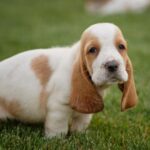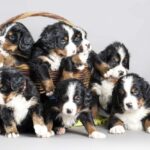Maine Coon cats are one of the largest domesticated cat breeds, known for their majestic appearance and friendly, easygoing personalities. But as big, active cats, they also have specific dietary needs that owners need to meet to keep them healthy and strong. What Does Maine Coon Cats Eat? Find out the answer in the article below with Alibay Store.
What Does Maine Coon Cats Eat?
Before diving into specific foods, it’s important to understand the nutritional requirements of Maine Coon cats. As obligate carnivores, Maine Coons require a diet primarily made up of animal protein. Unlike humans or even some dog breeds, cats cannot thrive on a vegetarian or plant-based diet. Instead, their bodies are designed to process proteins and fats derived from meat.
A balanced diet for a Maine Coon cat should include:
- High-Quality Protein: Protein should make up the majority of their diet, as it supports muscle development, energy levels, and overall health.
- Healthy Fats: Fats provide a key source of energy and help maintain their thick, luxurious coats.
- Essential Vitamins and Minerals: Taurine, an amino acid found in animal tissues, is particularly important for maintaining heart and eye health in Maine Coon cats.
- Water: Hydration is crucial for preventing urinary issues and ensuring overall health.
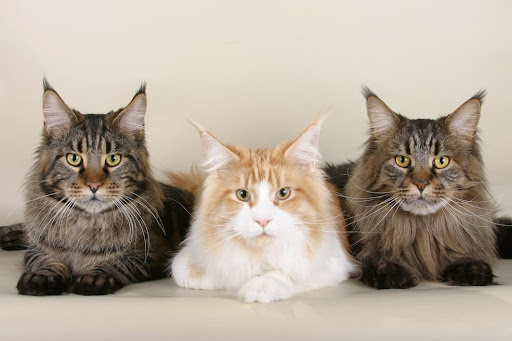
What Does Maine Coon Cats Eat For Diet Look?
High-Quality Commercial Cat Food
The majority of Maine Coon owners feed their cats commercial cat food, either dry kibble, wet canned food, or a combination of both. When choosing a commercial food, it’s important to look for products that meet the specific nutritional requirements of large, active breeds like Maine Coons.
- Dry Food (Kibble): Dry food is convenient and can help keep a cat’s teeth clean, but it should be high in animal protein and low in carbohydrates. Look for cat food that lists high-quality sources of animal protein, such as chicken or salmon, as the first ingredient. Avoid cat food that contains fillers and by-products, as these offer little nutritional value.
- Wet Food: Wet food is another excellent option, as it typically contains more meat and fewer fillers compared to dry food. It also helps with hydration, which is important since cats naturally have a low thirst drive. Maine Coons will benefit from wet food as part of their regular diet to ensure they get enough moisture, especially if they don’t drink a lot of water.
In addition to animal protein, Maine Coons require a diet rich in omega-3 fatty acids, which support their coat and skin health. Omega-3s can be found in fish-based foods or added as supplements.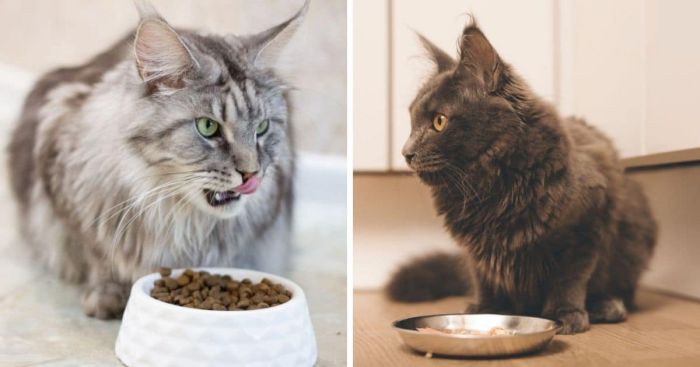
Raw or Homemade Diet
Some Maine Coon owners opt for a raw or homemade diet, which can closely mimic what a cat would eat in the wild. This typically includes raw meats such as chicken, turkey, or rabbit, along with organs like liver and heart, and bone content for calcium.
If you choose to feed your Maine Coon a raw or homemade diet, it’s important to consult with a veterinarian or pet nutritionist to ensure you’re providing a balanced diet that includes all the necessary nutrients. Raw diets can be beneficial but must be prepared with care to avoid nutrient deficiencies and bacterial contamination.
What Types of Protein Should Maine Coons Eat?
Since Maine Coons are obligate carnivores, the primary source of their diet should be animal protein. Here are some excellent protein sources for Maine Coons:
- Chicken: One of the most common proteins found in cat food, chicken is lean and easy to digest, making it a great choice for Maine Coons.
- Turkey: Similar to chicken, turkey is another lean protein that cats enjoy.
- Rabbit: A more novel protein, rabbit is often used for cats with food sensitivities and can be a good alternative for Maine Coons.
- Fish: While fish like salmon or tuna can be fed occasionally, it should not make up the bulk of their diet, as too much fish can lead to mercury build-up or other issues. Fish can be a great source of omega-3 fatty acids, which help maintain a healthy coat.
- Beef: Beef can also be included, but it is typically fattier, so it’s best fed in moderation.
Essential Supplements for Maine Coon Cats
If you’re feeding a homemade or raw diet, you may need to include certain supplements to ensure your Maine Coon gets everything they need:
- Taurine: Essential for heart health, this amino acid is found naturally in animal tissue and must be included in their diet.
- Omega-3 and Omega-6 Fatty Acids: These fats promote healthy skin and a shiny coat.
- Calcium and Phosphorus: These are crucial for maintaining strong bones and teeth, particularly important for large breeds like Maine Coons.
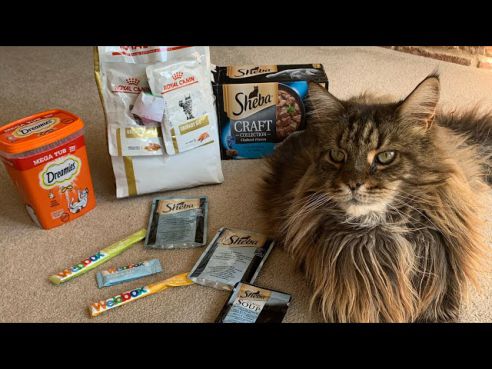
Feeding Schedule for Maine Coon Cats
Maine Coon cats are big eaters due to their size and active nature. However, it’s important to avoid overfeeding, as obesity can lead to health problems like joint pain and diabetes. Feeding your Maine Coon in controlled portions at regular intervals will help keep them at a healthy weight.
- Kittens: Maine Coon kittens grow rapidly and require more frequent feedings than adult cats. They should be fed 3-4 small meals per day to support their growth and energy needs.
- Adults: Once your Maine Coon reaches adulthood (around 1-2 years old), you can transition to 2 meals per day, or free-feed them if you use dry food. However, portion control is key to preventing overeating.
- Seniors: As Maine Coons age, they may become less active and need fewer calories. Be sure to adjust their portions to avoid unnecessary weight gain in their senior years.
Foods to Avoid for Maine Coon Cats
Certain foods can be harmful or toxic to Maine Coons and should be avoided at all costs. These include:
- Onions and Garlic: These can cause gastrointestinal issues and damage red blood cells in cats, leading to anemia.
- Chocolate: Chocolate contains theobromine, which is toxic to cats and can cause severe health issues.
- Dairy Products: Contrary to popular belief, most cats are lactose intolerant. Feeding your Maine Coon milk or cheese can lead to digestive upset, including diarrhea.
- Raw Fish: While cooked fish can be an occasional treat, raw fish contains enzymes that destroy thiamine (a B vitamin), which can lead to neurological problems in cats.
- Bones: Although raw bones are sometimes included in raw diets, cooked bones should never be fed to cats, as they can splinter and cause choking or internal injury.
How Much Should a Maine Coon Eat?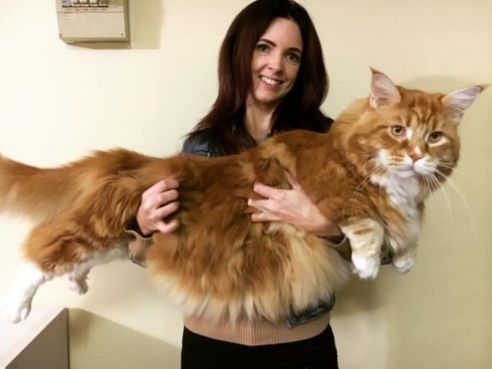
The amount of food a Maine Coon needs depends on their age, size, activity level, and whether they are spayed or neutered. On average, an adult Maine Coon will need around 250-400 calories per day, but this can vary.
A general guideline for feeding Maine Coons is:
- Kittens: Feed around 80-100 calories per pound of body weight daily.
- Adults: Feed around 30-40 calories per pound of body weight daily.
- Seniors: Reduce the intake slightly to prevent weight gain.
It’s always best to consult with your vet to determine the exact caloric needs of your Maine Coon based on their individual factors.
Maine Coon cats are obligate carnivores, meaning their diet should be rich in high-quality animal proteins like chicken or salmon, with minimal fillers or by-products. Their large size and active nature require a diet that supports both energy and overall health, especially with the addition of omega-3 fatty acids for maintaining a healthy coat and skin. By providing the right balance of nutrients, you can ensure your Maine Coon enjoys a long, healthy life free of dietary-related issues.
For those looking to celebrate their love for this majestic breed, check out the Maine Coon Cat Ornaments from Alibay Store. These beautifully crafted pieces are the perfect way to showcase your affection for your furry friend while adding a touch of charm to your home. Don’t miss out—shop now!

